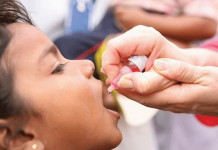By Minahil Makhdoom
ISLAMABAD: Food and Agriculture Organization of the United Nations (Headquarter) on Tuesday held a webinar on “Addressing the gendered impact of COVID-19: Experiences from Pakistan”. FAO and UN Women Pakistan participated as speakers to explore the gender and COVID-sensitive Risk Communication and Community Engagement (RCCE) activities of the two UN agencies.
The event was part of a webinar series addressing Risk Communication and Community Engagement (RCCE) for COVID-19 prevention along the food value chain supported by the European Union, under the partnership programme contributing to the Global Network Against Food Crises, and the American People through the U.S. Agency for International Development. FAO Representative in Pakistan, Mina’ Dowlatchahi and Country Representative UN Women, Sharmeela Rassool presented the experiences and lessons learnt.
Speaking at the webinar, Mina’ Dowlatchahi, highlighted that “FAO is raising awareness amongst rural women regarding the impact of COVID-19 on food and agriculture, value and supply chain, food prices and food security. 68% of rural women and girls in the labor force are employed in the agriculture sector in Pakistan, 19% are in paid employment in agri-sector whereas remaining are unpaid workers.
She noted that “With COVID-19, the multidimensional gender inequalities and gender gaps have exacerbated, giving rise to massive challenges across the country, striking on societies and economies. Women are immensely affected, as they are more exposed to health risks, loss of income, and take on a larger share of unpaid care work and face a heightened threat of gender-based violence during social confinement measures”.
Addressing the participants at the webinar, Ms.Sharmeela Rassool underscored the challenges and way forward to confront the hurdles, she said “UN Women has engaged all the effective communications channels including social media and direct community sessions in selected districts to sensitize communities on COVID-19 preventive measures, SOPs, social distancing, symptoms and post infection care, and gendered impact of the pandemic. She further stressed to enhance our combined efforts in narrowing the gendered impacts of COVID-19.
The webinar concluded with the emphasis on addressing the needs of inclusive efforts for ‘gender impacts of COVID-19’ as it will have a direct influence on progressing our journey towards realizing Sustainable Development Goals (SDGs), particularly SDG 8, decent work; and SDG 5, gender equality.
The COVID-19 pandemic calls for an instant synchronized, people-centered and gender-sensitive response. Governments, businesses, workers’ representatives and individuals, all need to mitigate the impact on people’s lives and to address the specific risks and vulnerabilities girls and women face.




